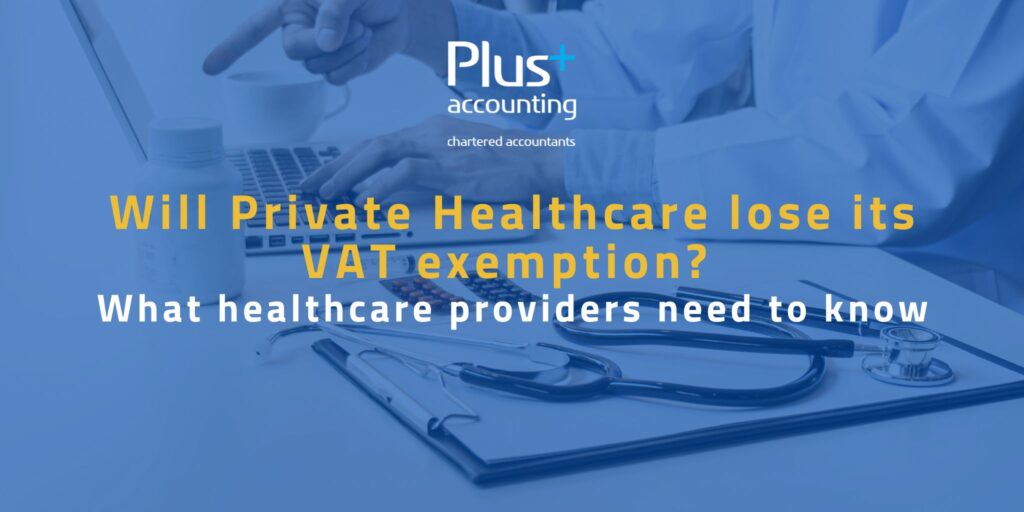
Recent coverage has focused attention on the possibility of changes to the VAT treatment of private healthcare in the UK. If you run a clinic, practice or provide medical services outside the NHS, even occasionally, this is an issue to watch closely. Below I explain what the current rules look like, what the likely practical impacts would be if exemptions are narrowed, and the sensible next steps clinics, locums and small private providers should take now.
Quick summary – the position today (high level)
- Many clinical services delivered by regulated healthcare professionals are exempt from VAT under existing HMRC rules. Typical examples include diagnosis, treatment and care where the purpose is to protect, maintain or restore health.
- Some services sit outside this exemption, commonly cosmetic or aesthetic treatments, wellbeing services and purely hospitality-style elements and are already standard-rated.
- The distinction between exempt and taxable services is all-important for VAT treatment and for whether your business can reclaim input VAT on costs.
Why this matters: exempt suppliers cannot normally recover VAT on their business purchases (except in very limited circumstances). A change that makes previously exempt services taxable would therefore affect pricing, cashflow and VAT recovery for many providers.
What the headlines are about (what to watch)
Media and industry commentary has suggested government interest in reforming the VAT exemption to raise revenue and to modernise the tax base. At this stage the proposals under discussion are about where lines are drawn between exempt and taxable services, not about abolishing patient access to care, but any change that increases the number of taxable healthcare supplies would have material consequences for private providers.
Practical impacts for private practices and clinics
If more services become standard-rated for VAT, you can expect effects across three core areas:
Pricing & patient charges
You may need to increase prices (or absorb the tax) to reflect the additional VAT liability. For many clinics that operate on tight margins or compete on cost, passing the VAT on to patients could reduce demand.
Cashflow & VAT recovery
If your services become taxable, you will be able to reclaim input VAT on purchases, but you will also have to account for VAT on sales and manage VAT returns. That switch can improve net profitability for capital-intensive providers (who can reclaim VAT on equipment, refurbishment, even some professional fees), but it can strain cashflow during the transitional period.
Compliance, systems & accounting
Your invoicing, bookkeeping and practice management systems (e.g. Xero, your billing software) will need to be updated. You’ll need clear records to support VAT classification and to handle partial exemption or mixed-use recovery rules where both taxable and exempt supplies are made.
Who will be most affected?
- Small private clinics and single-practitioner practices that currently treat most income as VAT-exempt (and therefore cannot reclaim VAT)
- Practices offering a mixture of exempt clinical work and taxable ancillary services (aesthetic procedures, certain therapies, some wellbeing services)
- Providers with large capital or renovation projects that currently incur non-recoverable VAT on costs.
Immediate steps we recommend (practical actions)
• Map your services now — make a short list of what you do and how each activity is currently treated for VAT (exempt vs taxable).
• Check contracts & price lists — identify where you would need to show VAT on invoices and whether your current patient terms allow for price adjustments.
• Review systems — ensure your accounting software (Xero, etc.) can handle mixed VAT rates and partial exemption calculations; upgrade if necessary.
• Cashflow modelling — run a quick scenario showing (a) VATable sales and reclaimed input VAT, (b) increased costs if VAT is charged but not passed to patients. This will highlight short-term working capital needs.
• Staff training & patient communications — prepare simple explanations for reception and billing teams, and a patient FAQ in case you need to change pricing or invoicing.
• Seek tailored VAT advice — the rules can be technical and context-specific (who is the supplier, what is the primary purpose of the treatment, is an activity ancillary?). Don’t rely on general guidance alone.
How an accountant can help – where Plus Accounting supports healthcare clients
We work with clinics, private practices, locums and healthcare start-ups to turn tax and accounting change into manageable action plans:
• VAT classification review: we assess your services and recommend whether particular treatments are likely to remain exempt or be taxable.
• Cashflow & pricing modelling: we build scenarios so you can decide how to absorb or pass on VAT costs.
• Systems & bookkeeping: we help implement the right Xero setup, configure VAT codes and, where appropriate, set up tools such as Dext and ApprovalMax to streamline recording and approvals.
• Partial exemption and recovery strategies: if you deliver both taxable and exempt services, we help you apply robust partial-exemption methodologies so you reclaim what you’re entitled to while remaining compliant.
Things to avoid
- Don’t assume every private treatment will automatically be taxable, the purpose of the service and the professional status of the provider are crucial.
- Don’t change prices or contracts without first modelling the financial impact.
- Avoid ad-hoc VAT accounting; inconsistent treatment of similar services attracts HMRC queries.
Final thought – be prepared, not panicked
Policy discussions about the VAT exemption for private healthcare will continue to generate headlines. For many providers the change, if it comes, will be manageable, but only if action is taken early. A small amount of planning today (service mapping, system checks and one scenario forecast) will avoid last-minute scrambling and help you protect patients, staff and margins.
If you’d like discuss your position in more detail, please contact Emma Hardwick, Outsourcing Director: we combine sector experience with practical accounting and systems knowledge so you can focus on delivering care, not tax headaches.
Author: Emma Hardwick, Outsourcing Service Director, Plus Accounting
Any views or opinions represented in this blog are personal, belong solely to the blog owner and do not represent those of Plus Accounting. All content provided on this blog is for informational purposes only. The owner of this blog makes no representations as to the accuracy or completeness of any information on this site or found by following any link on this site. Please note that AI has been utilised in generating content for this blog.
Date Published: 21 October 2025


